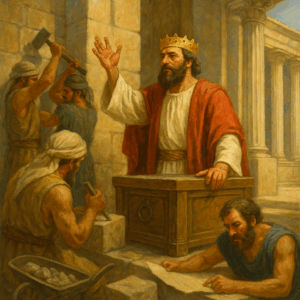The priestly role in Leviticus 21.
Leviticus 21 outlines the qualifications and regulations for priests within ancient Israel. While some may interpret it solely as outdated restrictions, the chapter offers a view into the significance of priestly purity and its role in maintaining the religious and social order of the Israelite community.
Serving in the sanctuary: Qualifications for priests.
The chapter details specific physical and social conditions that would disqualify men from serving as priests. These regulations emphasized the importance of maintaining a state of ritual purity for those officiating in sacred rituals within the Tabernacle.
Beyond the literal: The meaning of purity.
The concept of purity in Leviticus 21 goes beyond physical perfection. It includes aspects of personal conduct and social standing. Priests were expected to avoid behaviors or associations deemed impure, such as contact with the dead or certain bodily fluids.
Understanding the context: A nation forged in faith.
It’s crucial to remember the historical context. The Israelites were a newly established nation, and their religious practices were central to their identity. Priests served as intermediaries between the people and God, and their purity symbolized the sanctity of their role.
Beyond the ritual: Exploring interpretations.
Modern interpretations of Leviticus 21 vary. Some scholars emphasize the historical significance of these regulations, highlighting the importance of maintaining a distinct priestly class within the Israelite community. Others explore the potential symbolism associated with purity, suggesting it represented a state of spiritual and moral fitness for serving in a sacred role.
Modern relevance: The role of religious leaders.
While the specific regulations of Leviticus 21 no longer directly apply to most modern religious institutions, the underlying themes offer valuable insights:
i. Importance of religious leadership: Recognizing the role of religious leaders in guiding communities and upholding spiritual traditions.
ii. Maintaining moral standards: Understanding the importance of ethical conduct and integrity for those serving in positions of religious leadership.
iii. Evolving practices: Acknowledging that religious practices and expectations for religious leaders adapt over time.
Conclusion.
Leviticus 21 offers a glimpse into the regulations governing priests in ancient Israel. By exploring the historical context, interpretations, and potential lessons beyond the literal, we gain a deeper understanding of the role of religious leadership and the concept of purity within a faith-based community.






